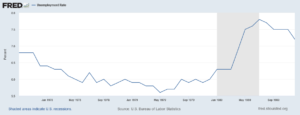September 19, 2022
There is a common myth that Germany’s hyperinflation led to the collapse of democracy in Germany and the rise of Hitler. That is a nice story for pushing the inflation hawks’ agenda, but it doesn’t correspond to reality.
The hyperinflation had ended by 1924 and Germany’s economy stabilized with moderate rates of inflation and unemployment. The economic event that most directly was associated with Hitler’s rise to power was the Great Depression and surge in unemployment that followed the crash of the US stock market in 1929.
This reality didn’t stop Jonathan Wiseman, in a NYT “political memo,” from invoking this myth in a piece on the political consequences of inflation.
“’From bitter historical experience, we know how quickly inflation destroys confidence in the reliability of political institutions and ends up endangering democracy,’ Helmut Kohl, the chancellor of Germany, said in 1995, harking back to the hyperinflation of the Weimar Republic.”
The piece also blames Jimmy Carter’s failed re-election effort on the inflation in 1979 and 1980.
“Four years later, Jimmy Carter’s dreams of a second term were vaporized by 13.5 percent inflation.”
While high inflation surely hurt Carter’s re-election prospects, we also had a severe recession in 1980.

The unemployment rate soared from 6.0 percent in December of 1979, to 7.8 percent in July of 1980. This was one of the fastest surges of unemployment in the country’s history. The run-up in unemployment, just months before the election, surely had a large impact on Carter’s prospects. It is very misleading to imply that it was just inflation that sank Carter.







Comments